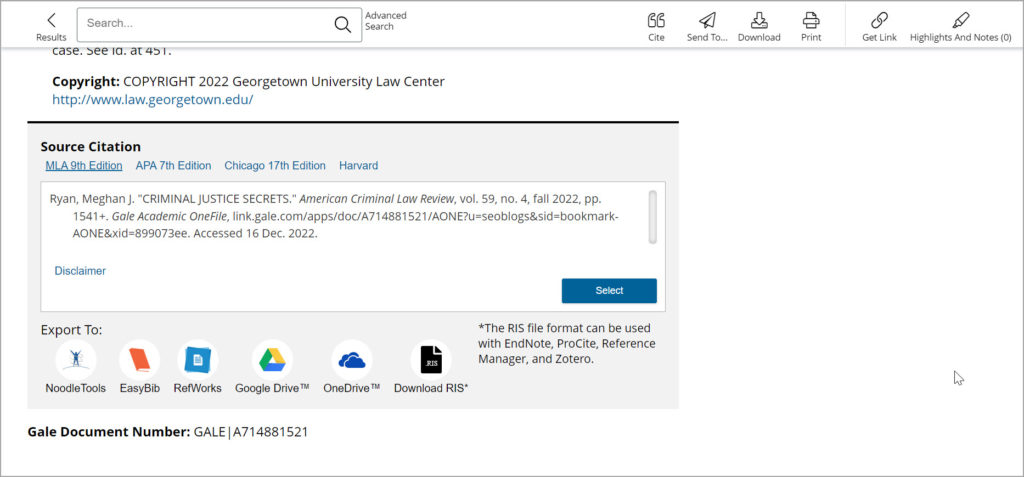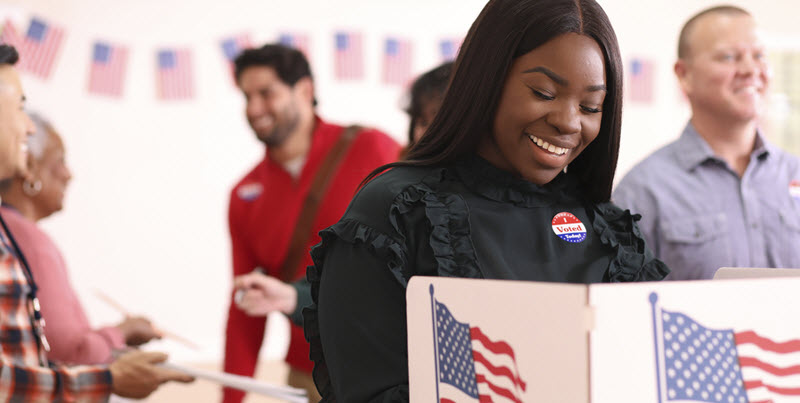The internet has never been so divisive, and college educators and librarians are finding it more challenging to ensure researchers use credible and impartial resources. It’s far too easy to stumble upon misrepresented facts, biased opinions, and misinformation disguised as news.
While media literacy is a popular topic during major elections, there’s no need to wait until November to discuss finding reputable sources. As election season comes and goes—along with campaign slogans, voting conspiracy theories, and alarming advertisements—you can leverage Gale Academic OneFile to connect students and researchers to unbiased, trustworthy content to explore and think critically about U.S. voting and more.
Find (and Cite) Meaningful Results
The content housed in Gale’s educational databases is designed to be accessible and reputable. Instead of hopping between different websites or databases, Gale Academic OneFile is a comprehensive resource for student and faculty research at every level. Whatever your query, Gale Academic OneFile combs through thousands of news articles, peer-reviewed journal entries, and podcasts to deliver high-quality results.
Gale’s collections span most academic topics, from civics to chemistry to criminal justice. Leveraging these targeted collections, professors can easily gather relevant content for their syllabi. Researchers can filter by date as well, ensuring the most relevant and current information. Plus, every result includes a citation, so academics can confidently build a bibliography as they find their sources.

Share Relevant, Impartial News
During election season, finding nonpartisan information can be daunting. At the same time, you want students to know how election fundraising works, how to spot biased content, and why voting is important. While U.S. voter turnout has increased in recent years, the United States is still far behind other democratically voting nations—the U.S. 2020 presidential election brought voter turnout to its highest point in over 120 years at 66.2%.
Many college students will be voting for the first time while in school; with Gale Academic OneFile, college educators and librarians can help ensure that these first-time voters have access to and know how to discern credible content. Gale Academic OneFile gives students and researchers access to millions of vetted periodical resources, including full-text articles from The Economist and The New York Times that provide more context for voting and election topics. Thousands of news files are also available to download from NPR and CNN.
Voting restrictions are one of today’s hot-button topics, with politicians espousing strong opinions as to the qualifications one needs to participate in the voting process. As such, it’s more important than ever that your college students have accurate tools to find the facts and dispute misinformation.
Provide More Accessible Academic Resources
Every college student may not have the same research skills and reading abilities, so ensuring your resources meet diverse academic needs is essential. Gale’s databases are built with different learning styles in mind and the latest accessibility features.
Platform navigation is user-friendly, with easy-to-filter search results. Researchers can narrow results by media type, publication date, subject, and more. Check out the unique Topic Finder, which visually displays which subjects are most often found related to search terms.
Articles include built-in highlighting and note-taking tools, and customizable citations make it easier than ever for students to build a bibliography and back up their findings. Pages are also easy to share and download across different university learning management systems.
Customize Learning for Researchers
Gale’s databases are highly customizable, and each resource includes visual and audio options. Students can choose from more than 30 languages in which to translate their findings, and all search results include a text-to-speech option. Researchers can even download audio files to their personal devices. To improve readability and assist those with visual impairments, users can also quickly adjust text size, color, and other display features.
As teaching and learning adapt to the world around us, it is important for colleges and universities to provide resources that help researchers find accurate information more easily and feel comfortable navigating digital content.
Connect Researchers to More Diverse Content
Gale’s resources are curated to promote equity, diversity, and inclusion. One search in Gale Academic OneFile can lead to dozens of publication types from various perspectives, including primary sources like letters, interviews, and congressional testimonies alongside surveys, essays, blogs, news articles, television broadcast transcripts, editorials, and more. Faculty and undergraduate learners can explore opposing views on contentious voting conversations, including immigrant rights, race, and women’s rights.
By leveraging the diverse resources in Gale Academic OneFile, you can help your students learn how to be objective while they research and ask critical questions about the information they find online.
Not a Gale subscriber? Learn more about Gale Academic OneFile.

